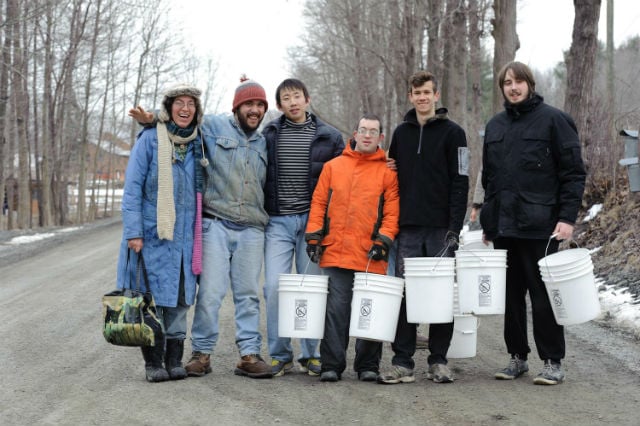The people at Camphill Village grow their own vegetables, perform various crafts, and generally share a simpler way of life. They engage in cultural and artistic activities, go on regular outings to see concerts or visit local farmers’ markets, and often interact with other local communities.
All in all, it’s a peaceful place to experience an alternative lifestyle and refresh one’s spirit.
There’s just one small difference between Camphill Village and other rural communities.
Of the 230 men, women and children living in the community, 100 have developmental differences.
Find out more about volunteering at Camphill Village
That’s what makes Camphill Village in Copake, New York so special. It’s a therapeutic life-sharing community established in the 1960s where villagers, people with developmental disabilities, and volunteers live together and contribute equally to make their community thrive.
_working_with_friend_in_Seed_Saving_(1).jpg) Volunteer SaraMae works with Mishka in the Seed-Saving Workshop. Photo: Camphill Village
Volunteer SaraMae works with Mishka in the Seed-Saving Workshop. Photo: Camphill Village
Each year, the village welcomes dozens of new volunteers aged 19 and over, who come from all over the world to support people with developmental disabilities, learn new skills, and brush up on English if it’s their second language.
Volunteers travel from across the globe, coming to Camphill Village from as far as Asia, Europe and Africa. Others, like Dan Hayden from New Jersey, aren’t a world away from home — even if it feels like it.
“Being from a suburb in New Jersey, Camphill is like nothing I’d ever seen before. Being up here in the mountains is another kind of beauty,” he told The Local.
Since arriving at Camphill earlier in 2017, Dan has been impressed by how well the residents with disabilities handle their everyday tasks.
“Having the farm with all the animals, and seeing the people with certain abilities being so independent and moving a whole herd of cattle on their own, and being so lively, it’s an attractive place to me.”
Volunteers spend a year at Camphill Village, although often, like Zimbabwean national Noma Motsi who has been there for one year, end up staying longer.
Noma first heard about Camphill Village from her aunt while she was living in South Africa. As a student, she did not have the chance to be particularly active in her home community and saw it as an opportunity to give something back.
“That’s what brought me to Camphill. The idea of discovering yourself while helping others and not expecting anything in return,” she told The Local.
_and_others_at_Camphill.jpg) Noma (right) has been volunteering at Camphill for over a year now. Photo: Camphill Village
Noma (right) has been volunteering at Camphill for over a year now. Photo: Camphill Village
Noma’s eyes have been opened by her time at Camphill, both by working with the residents and by meeting other volunteers from all over the world. Over the one year she’s been there, she has worked with volunteers from countries such as China, Guatemala, and Latvia.
“It can really change something in you,” she says. “You become a better person which is what the world needs right now. It’s a different lifestyle, but life is about risk-taking.”
Noma’s fellow volunteer, Antonia Goevert from Germany, first heard about Camphill Village when she graduated from high school. She had been feeling uncertain about her next move but knew for the time being she wanted to do something meaningful.
Seeking something different, Antonia got in touch with her local volunteering agency which told her about Camphill Village. She liked the sound of it straight away and spent a year living in the community.
“The whole concept was very interesting to me. It’s always worth it to try something different and learn something new. At Camphill Village, it’s like brightening up the horizon and you grow as a person too.”
Among other daily tasks, she spent her afternoons working in the candle shop where she learned how to dip candles and work with beeswax.
Learn more about Camphill Village gap year/service year programs
“It’s so nice to do something crafty, it’s something I’ve never done before. It’s great because you develop new skills.”
She says she would wholeheartedly recommend Camphill Village to other young people interested in volunteering, describing it as the “best decision”.
The three volunteers unanimously agree that Camphill Village offers perspective and the chance to get a better sense of self all while giving something back to the community.
As Dan puts it: “This place has so many opportunities in so many different areas. It’s an amazing place for growth and change.”
This article was produced by The Local Client Studio and sponsored by Camphill Village Copake.



 Please whitelist us to continue reading.
Please whitelist us to continue reading.